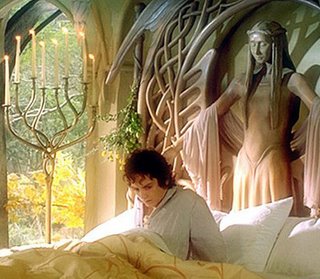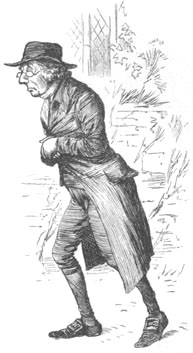
This evening I find my way to a safe house of the Cancer Underground.
For some time, I've been aware of a local non-profit organization called the Cancer Concern Center. It was founded by a couple of cancer survivors, who wanted to provide a place for people with cancer to gather and receive various supportive services.
One of the things the Cancer Concern Center offers is support groups, and it's into one of these weekly meetings that I walk this evening. The Center's very basic office set-up consists of three rooms. The outer room is equipped with a receptionist's desk, literature racks and such. Just off it is a small kitchen. The inner room is furnished like a comfortable living room in someone's home, with space for about ten people to sit on upholstered chairs and sofas.
 That's about as many as are here tonight. Except for one other man, the group is all women (no surprise there – a lot of us guys have a hard time getting beyond the Lone Ranger thing). I'm the only first-timer present this evening. The others all seem to know each other well.
That's about as many as are here tonight. Except for one other man, the group is all women (no surprise there – a lot of us guys have a hard time getting beyond the Lone Ranger thing). I'm the only first-timer present this evening. The others all seem to know each other well.One member of the group is serving as an informal convener. She opens the place up, puts some water on for tea, and tells us when to begin and end. Once those parameters are set, it's pretty much free-form. Someone suggests that, since I'm a newcomer, the others ought to share their cancer stories, after which I'll be called upon to do the same. And that, pretty much, is the agenda for the evening – with frequent interruptions for comments, questions, even side-conversations. (I learn, later, that the Center's Tuesday-noon support group is more structured, with a clinical social worker offering a more directive leadership style; tonight's group is a bit chaotic, but displays a warm and affirming spirit.)
Nothing is said beforehand about confidentiality – or any other group guidelines, for that matter – but I assume this has to be an important value. For that reason, I won't share any details here of individual stories, except in the most general terms.
Some of the group members, like myself, are actively receiving treatment. Others are in remission. Some are looking pretty strong and healthy, while others are visibly sick or in pain. A variety of cancers are represented – some highly treatable, others less so. It's a cross-section of the cancer world.
I'm impressed by the open, accepting nature of the group. Coming for the first time into any other new group of people, I could expect to feel like an outsider for a while – but not with this crowd. I've already met the membership requirement: I've got cancer.
A few minutes into the meeting, a minor bump in the road arises. It's something all ministers, priests and rabbis have learned to anticipate, as we stick our heads up in purely secular settings like this one.
 Some people get a bit flummoxed as soon as they discover there's a member of the clergy in their midst. I've learned to anticipate this sort of double-take at events like wedding receptions, for example. Striking up a casual conversation with a fellow wedding guest – perhaps while waiting in line at the bar – the subject of my occupation may come up. As I respond, saying I'm a minister, I can almost hear the cerebral gears grinding. My conversation partner mentally rewinds the tape of the past few minutes, frantically checking for forbidden words he or she may have uttered. Some people, it seems, really do think we minister-types are the profanity police – although the reality is, we've got far more important things to do than get flustered at four-letter words.
Some people get a bit flummoxed as soon as they discover there's a member of the clergy in their midst. I've learned to anticipate this sort of double-take at events like wedding receptions, for example. Striking up a casual conversation with a fellow wedding guest – perhaps while waiting in line at the bar – the subject of my occupation may come up. As I respond, saying I'm a minister, I can almost hear the cerebral gears grinding. My conversation partner mentally rewinds the tape of the past few minutes, frantically checking for forbidden words he or she may have uttered. Some people, it seems, really do think we minister-types are the profanity police – although the reality is, we've got far more important things to do than get flustered at four-letter words.Something similar happens to me this evening. When I'm asked what I do for a living, I reply that I'm the pastor of the local Presbyterian Church. The response around the circle is generally positive, but there's also some nervous laughter and disclaimers about this group being pretty frank in its language. It seems the conversation gets rather earthy at times – as is perfectly natural, when topics of conversation cover subjects like mastectomies and testicular cancer and certain intestinal side-effects of radiation. Don't hold back on my account, I tell them – and I hope they believe me. Even if I did have a passion for policing people's language (and I don't), I haven't come here tonight as a minister. I've come as a fellow cancer survivor.
 Ministry is a strange occupation. Some have likened it to a third sex. People welcome us into their lives at moments of great pain and intimacy, but then at other times they hold us at arms' length. For some, we symbolize love and acceptance, while for others we call to mind intolerance and judgmentalism. I've been doing this long enough to realize that such responses have nothing to do with me, personally. They go with the territory. So I let it pass, and hope that this is the last I'll hear anyone refer to the tender sensibilities of the clergy.
Ministry is a strange occupation. Some have likened it to a third sex. People welcome us into their lives at moments of great pain and intimacy, but then at other times they hold us at arms' length. For some, we symbolize love and acceptance, while for others we call to mind intolerance and judgmentalism. I've been doing this long enough to realize that such responses have nothing to do with me, personally. They go with the territory. So I let it pass, and hope that this is the last I'll hear anyone refer to the tender sensibilities of the clergy.I feel an instant point of connection with the details of the group members' stories. We swap tales of chemotherapy side-effects, doctor's appointments, and ways to maintain balance in work and family life. I learn that Dr. Lerner and Dr. Kaufman are both held in high regard. We laugh about funny things that have happened to us in radiology suites and waiting rooms. When someone speaks of pain – emotional or physical – there's a respectful, attentive silence, followed by words of encouragement. These are people who can accept the reality of pain, without feeling the need to minimize it or explain it away: and that's a rare and wonderful thing.
 I think I'll come back.
I think I'll come back."Bear one another's burdens, and in this way you will fulfill the law of Christ."
– Galatians 6:2
No comments:
Post a Comment